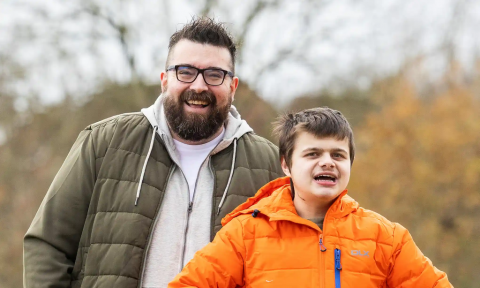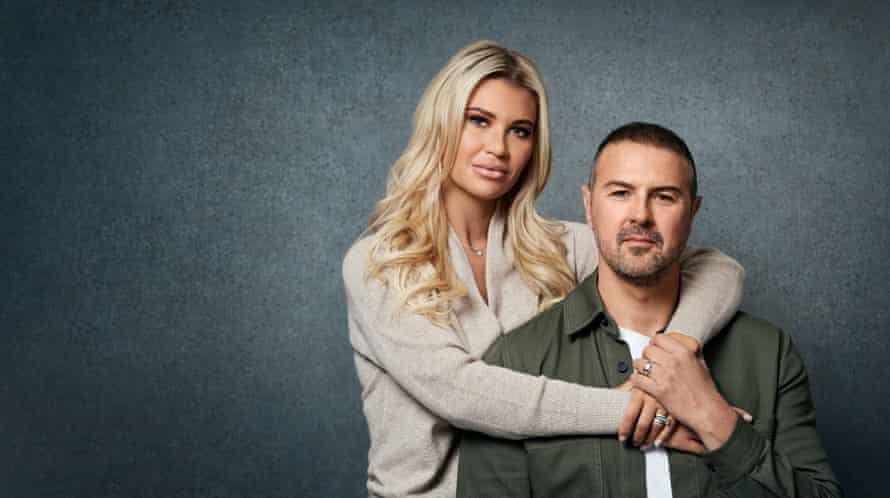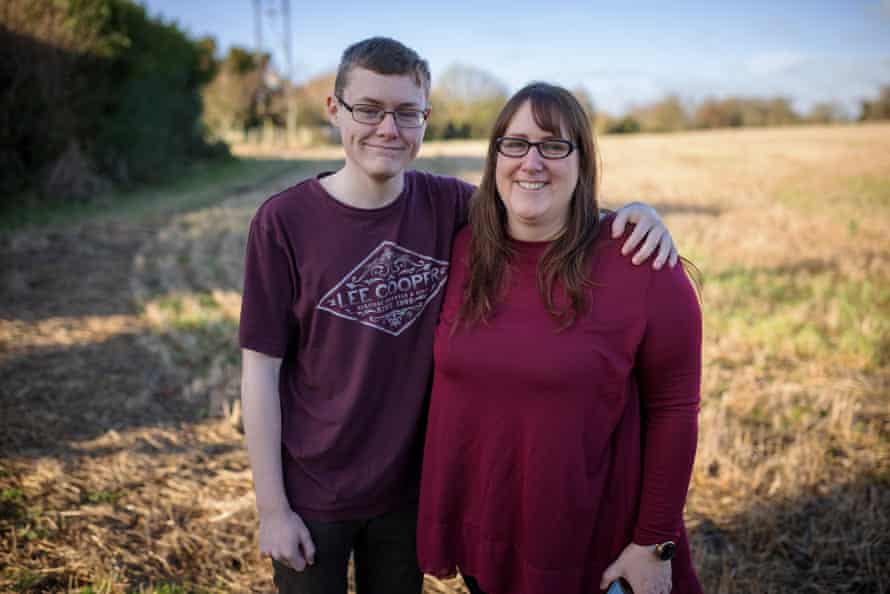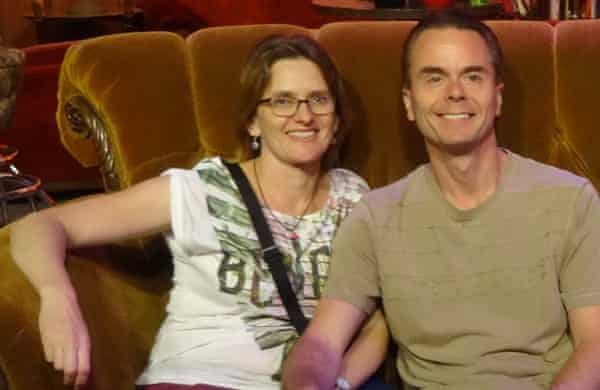
The recorded incidence of autism has increased 787% in 20 years. For many parents, getting help for an autistic child alerted them to their own traits
When John Purnell’s 10-year-old son was diagnosed as autistic, he knew exactly how to respond. “I’ve always been fascinated by research, by detail, by finding out everything there is to find out about something,” he says. “So I did a really deep dive.”
As he pored over academic papers and delved into medical science – including how many autistic people have a propensity and appetite for copious research – an unexpected realisation crept into his mind. “I was reading about the traits of an autistic person, the difficulties they often have in social situations, the need for order and planning: and suddenly I thought: this person they’re describing isn’t just my son – it’s me.”
Purnell is far from alone in discovering that he’s autistic as a result of his child being diagnosed. Viewers of a recent BBC One documentary, Our Family and Autism, saw the same thing happen to the model Christine McGuinness, whose three young children with her television presenter husband, Paddy, are all on the autistic spectrum. In recent years, the number of people diagnosed with autism has rocketed; a study of diagnosis trends, published in August, found the median age for diagnosis is 10 for males and 13 for females, and there was a 787% exponential increase in its recorded incidence, in the 20 years to 2018.

Discovery … Christine and Paddy McGuinness, from the TV documentary on their family. Photograph: Vincent Dolman/BBC/Raw Factual
An unexpected result of the greater number of children being diagnosed has been that many parents have discovered that they are autistic, too, often by figuring it out for themselves, as both Purnell and McGuinness did. There are no exact figures, says Professor Simon Baron-Cohen of Cambridge University, Britain’s leading academic on autism, but it is a phenomenon. And it’s not that there are suddenly more autistic people, but that diagnosis in the past was inadequate and medicine is catching up.
Often, says Baron-Cohen, these autistic adults do not necessarily need a formal diagnosis. “The key question is: are autistic characteristics interfering with your ability to function?” While he welcomes the more accurate picture, he doesn’t want the new numbers to dilute the understanding of what it means to be autistic. “It’s a medical diagnosis and you only get it if the symptoms you have are causing distress,” he points out.
Purnell, managing director of a successful business, has adapted well – on one level at least. “Now I understand my autism, I can see how helpful it has been through my working life,” he says. In a letter to colleagues after the diagnosis, he wrote: “Among the many benefits I see for being autistic is that I’m incredibly organised and get a lot done. I also have a very strong attention to detail, can take into account a lot of information quickly and see relevant patterns that help me make good decisions.”
The condition also explains behaviour his colleagues might have found unusual. “There have been times when I’ve said to people I work with: ‘I really don’t care what anyone thinks of me.’ And they have said: ‘Really? Do you really not care?’”
The world needs to get used to autism – it’s not that autistic people need to get used to the world
All his life, Purnell has found socialising very stressful and his teenage years were extremely difficult: he battled depression, anxiety and anger, which he now knows are linked to his condition. In the McGuinness family documentary, Christine comes close to tears after receiving her diagnosis from Baron-Cohen. It’s such a relief, she says, to realise she wasn’t just being difficult. Like so many autistic people, John included, the hardest thing has been trying to fit in with societal norms established by neurotypical people. The important takeaway for society as a whole, Baron-Cohen believes, is that it’s the world that needs to get used to autism – not autistic people who need to get used to the world.
The reason children are more likely to be diagnosed now is down to increased awareness among parents and teachers; and the reason it’s likely to be diagnosed at 10 and 13, is that it usually coincides with the move from primary to secondary school. “Having to navigate a much bigger and more complicated social scene often makes autism more apparent,” says Baron-Cohen.
A spin-off from the phenomenon of a parent’s diagnosis, after the child’s, is that it has drawn more attention to the fact that autism also affects women. “You get a lot of women who have been diagnosed with an eating disorder because they were very fussy with their food – but it wasn’t an eating disorder, it was autism,” says Baron-Cohen. Preferring a range of very specific, often bland, foods is another trait of autism – Christine McGuinness describes it in the documentary as “eating beige food”.
Kiri-Lynn Gardner, 40, was also diagnosed as a result of her child’s autism: her son Finn, now 17, was diagnosed when he was five. She noticed similarities between her own experiences and his, and sought a test. “My son was very typically autistic – he likes lining things up, he’s highly organised. I could relate to so much in his behaviour.” Getting her own diagnosis in 2016 was still a shock, but she immediately realised there were benefits. “The specialist I saw understood me in a way I’d not been understood before.”

Changed understanding … Kiri-Lynn Gardner, who was diagnosed with autism after her son Finn, left, was too. Photograph: Sam Frost/The Guardian
Her mother had endured a lifelong struggle with mental health issues, not autism-related, and Gardner feared she had the same difficulties. “I always assumed it was just how things were and how they would always be,” she says. “But unpicking it has meant I’ve learned about the really quite small things that can make a huge difference to my life. Things like realising I don’t have to attend a social event – not because I don’t want to be part of it, but because there’s too much sensory overload. I used to feel guilty about missing things, but now I make allowances for myself, and my family and other people around me do the same. So, for example, when we go on holiday I’ll often have a bit of a meltdown because the place doesn’t look exactly like it does in the brochure. In my head, I’ll have been expecting it to be just the same. But now I know why, and my family expects it, it’s fine.”
Lockdown, Gardner thinks, would have been nigh-on impossible without her diagnosis: autistic people need structure and tend to struggle a lot with uncertainty and different routines. She even credits the diagnosis with keeping her marriage together. “I think we might have got divorced if I hadn’t known. My husband can now understand that my behaviour is the condition I’ve got.”

Paula and John Purnell, who was diagnosed with the condition after their child’s diagnosis. Photograph: Courtesy of John Purnell
Purnell’s marriage has benefited, too. His wife, Paula, has worked with children – he describes her as the yin to his yang and, while all good marriages need that, it’s even more important for autistic people because a partner can take on some of the activities the autistic person finds difficult – organising a social life, for example. Perhaps, too, it’s easier for men to find “caring” partners than it is for women, another reason it can be harder for women with autism to cope with adult life. Paula says a big plus of John’s diagnosis is that they understand some of the difficulties, and can now work around them. “I used to feel guilty about going out with my friends without him, but now I can go out and he stays at home,” she says. “Before, I’d organise nights out with other couples and he’d come along grudgingly – I’d think he was just being difficult.”
A game-changer for adults with autism is the Autism Act 2009 (this is the only condition with its own act of parliament) which gives people the right to a diagnosis, regardless of age. “There is now a requirement on the part of local authorities to provide an adult diagnostic pathway,” says Tim Nicholls, head of policy at the National Autistic Society. Yet many people, of all ages, wait far longer than they should for an assessment. This was noticed before the pandemic, and is almost certainly worse now. That is important for many reasons, not least that while autism is not a mental health disorder, people who have it may be more prone to anxiety and depression. Baron-Cohen says two thirds of the adults who come to his clinic have had suicidal thoughts, and a third have attempted to kill themselves.
For Gardner, diagnosis has been bittersweet. On one hand, she is pleased that her experience is useful to Finn – like Christine McGuinness, she feels she is a positive role model, and is living in a way that proves autistic people can have a job or career, and a relationship (Baron-Cohen points out that 85% of autistic adults are not in employment). On the other hand, Gardner mourns the childhood and adolescence that she might have had. “It’s disappointing that I didn’t have the help I needed growing up, especially now I know that small things can make a huge difference,” she says.
Purnell’s son, who prefers not to give his name, says his father’s experience has brought him benefits, too. “Diagnosis and personal research helped him and, in turn, helped me to understand autism and mental health better,” he says.
It’s clear that, in general, increased parental diagnosis is linked to genetics and, indeed, says Baron-Cohen, science has found there are definite chromosomal factors. Recognising a diagnosis because of a child isn’t always down to genetics, though. Kevin Chapman, 39, who lives in Northampton, was diagnosed after he met a new partner, whose son – now his stepson – was found to be autistic, aged eight. That led Chapman to do an online quiz – the AQ or autism spectrum quotient that the McGuinnesses did in the documentary – and his score indicated that he is within the autistic range. “I’ve not finished the formal process, but a lot of things have fallen into place for me,” he says. “I’ve always found it hard to make friends, always thought of myself as an outsider. I tend to get obsessively interested in things – computer coding, for one.”
There are many ways in which life can be improved for adults who find they are autistic, says Baron-Cohen. “A lot of autistic people find noisy environments difficult, and they have sensory difficulties. They need a calmer environment, and getting a diagnosis is a good way to say to an employer: ‘I need a reasonable adjustment to my work surroundings, which you’re entitled to do under the Equality Act’.” In fact, as he points out, making life easier for people with autism is all about acknowledging that they are different in the same way that people are different in terms of gender and ethnicity. “What’s really good is that people are realising that neurodiversity is part of a person’s identity in exactly the same way these things are,” he says.
What about autistic adults who don’t have children to flag up their issues? Baron-Cohen says other reasons for adults coming forward to be tested for autism include a long history of difficulties in maintaining relationships – friendships and intimate partnerships – and a history of difficulty in getting on with people at work. “I see people, for example, who keep ending up in industrial tribunals, and that prompts them to think: why is this happening to me?” he says. But for some adults, the stigma of being labelled “autistic” is still offputting.
It’s incumbent on us all, says Baron-Cohen, to help reduce this stigma: increased diagnosis is good for everyone, not only autistic people. One of John Purnell’s favourite quotes is from Mary Temple Grandin, an American scientist who was diagnosed as an adult. What would happen, she asked, if autism didn’t exist? Her answer: “You’d have a bunch of people standing around in a cave. Chatting and socialising, yes – but not getting anything actually done.”